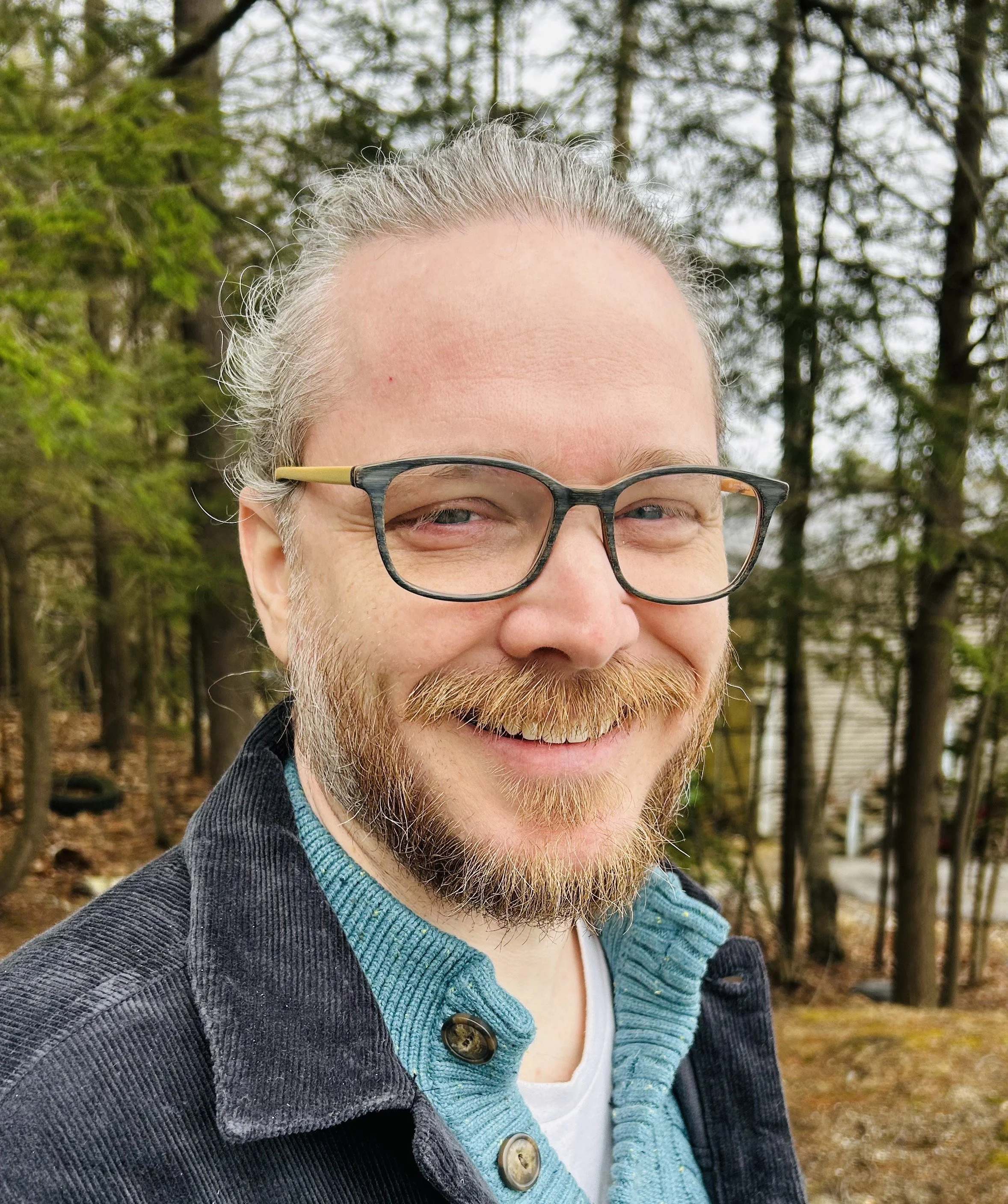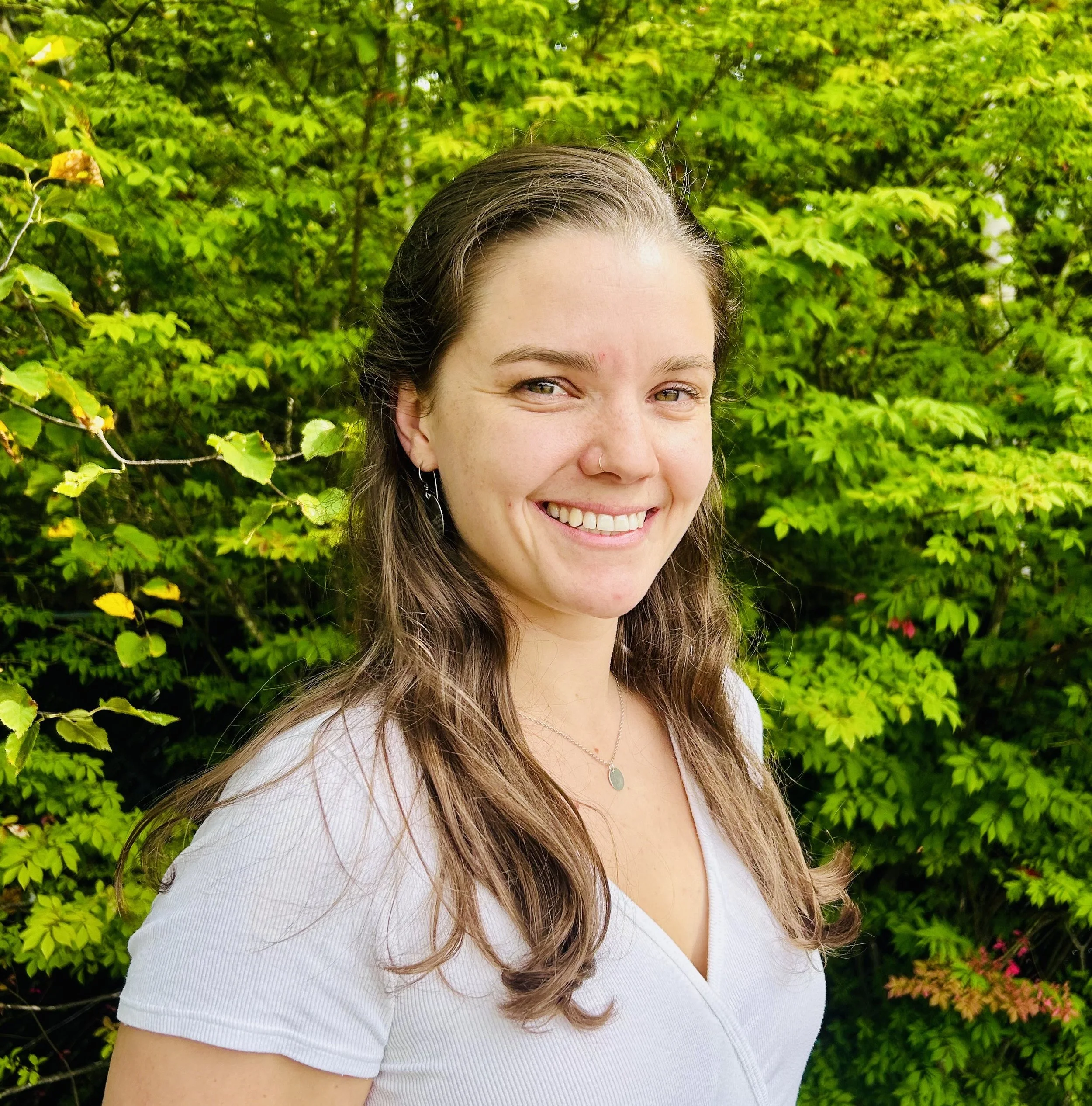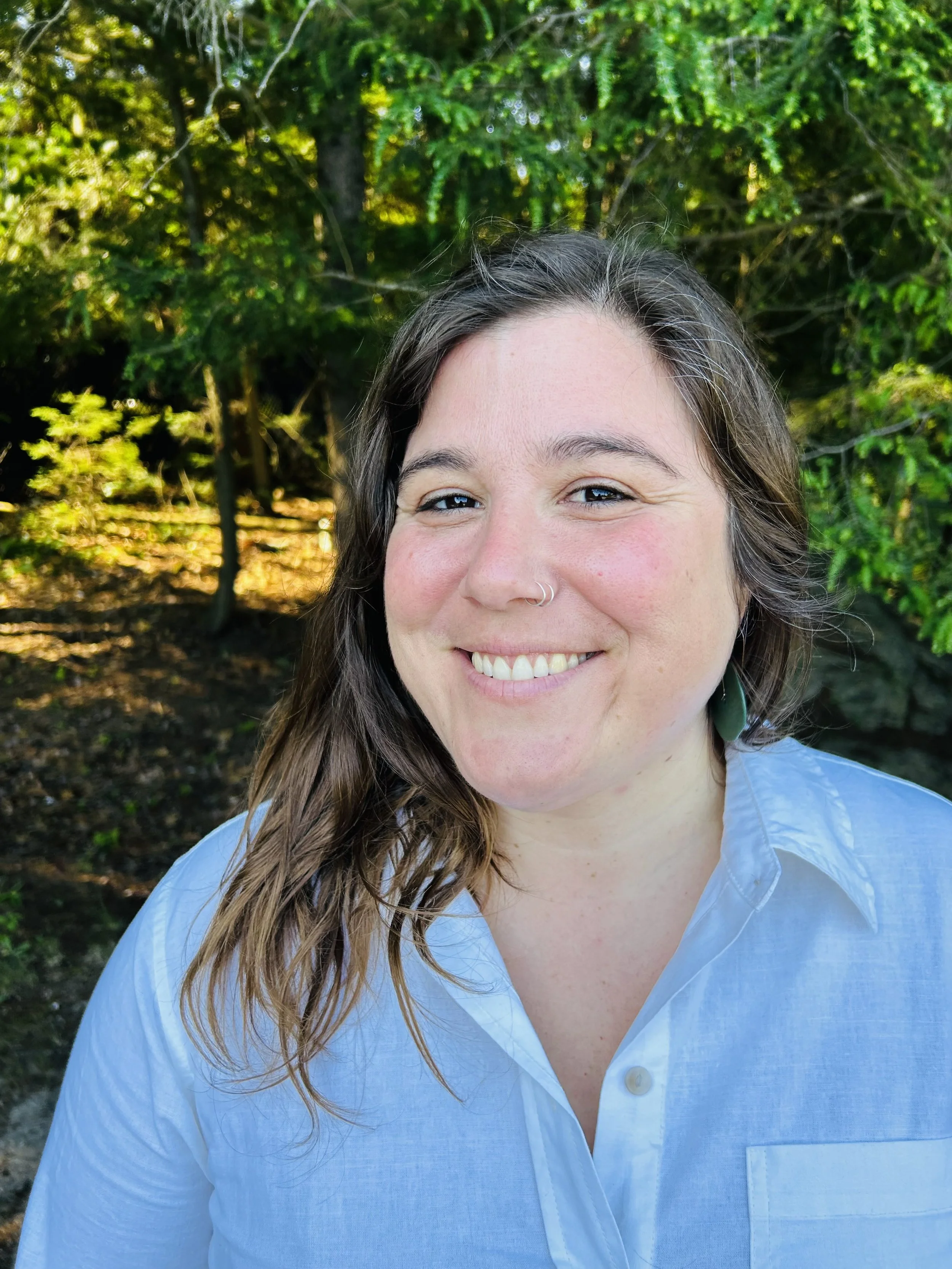Our Team
-

Grace Wright LCSW (she/her)
Grace co-founded the Partnership for Trauma Recovery in 2015 with the goal of establishing a practice that provides trauma informed and focused care. Grace’s philosophy on therapy is that our present difficulties are the result of past experiences that have shaped the neural networks in our brain, which triggers us to react in certain ways. This causes an often subconscious process of engaging in patterns of behavior that can be disturbing, unhelpful, and often harmful to our daily lives. This most often manifests in clients coming in feeling “stuck” in their lives and often in previous attempts at therapy where the symptom was the focus of treatment instead of the underlying problem. The work of therapy then becomes identifying, understanding, and shifting those experiences at the root of these daily problems instead of simply learning to cope with the struggles. By engaging in this kind of work, lasting, meaningful change occurs which liberates clients from those patterns they have lived with.
While philosophy and treatment modalities are important, Grace also knows that the relationship between therapist and client is the most important part of successful therapy. She places a high value on the relationships she has with her clients, and works hard to build a mutual sense of trust and understanding – injected with humor whenever possible.
Grace’s areas of specialty include Post Traumatic Stress Disorder, dissociative disorders, complex trauma, personality disorders, and attachment trauma. Grace uses many trauma based modalities in helping her clients achieve change, including Eye Movement Desensitization and Reprocessing (EMDR) therapy. Grace has an undergraduate degree from Elmira College and a Master’s degree in Social Work from the University of Southern Maine.
-

Andrea Brewster LCPC, CCS (she/her)
Andrea describes her work as: Unraveling the wisdom of habits which saved you once, and today, distances you from your dreams. Having someone actively joining with you as you travel toward your dreams, can be powerful.
Andrea is a whole-hearted, fun and flexible therapist, who designs your interventions collaboratively. Join in the humor of being human together. Finding joy and laughing together means it’s we are playing and playing is creative and creativity can be the palette for growth. In practice since 2001 she brings experience from community mental health, supervision and leadership. Whether you are in a helping field facing the stress of our times, creating your career goals, or putting your life together after break up, divorce or loss, or facing college or mid-life, she knows tackling life at the point of transition can be hard but rewarding. Doing so with trauma, depression, anxiety or addictive thinking can be very challenging. Why not do it together?
Andrea holds a Master’s Degree from Antioch New England Graduate School with a concentration in Expressive Arts Therapy. She studied with Penny Lewis, an expert in the Expressive Arts. She began her career as a child and family therapist . She developed expertise on the impact of early attachment trauma, across the lifespan. Studied with Dan Hughes a Maine expert on Child Attachment. Dialectical Behavioral Therapy, Trauma focused Cognitive Behavioral Therapy and Cognitive Processing Therapy, inform her treatment approach for adults affected by disruptions to their child development. Skills training and Parenting groups, substance recovery, eating disorder and schizophrenia have been other areas of expertise over the years.
You can expect that beginning therapy will be about; learning how you learn, motivate, change, grow or become stuck. Exploring strengths is what will raise us up, so we spend time in your great moments. We spend time hearing what your difficult moments are saying to you. There is nothing like good long chats with the parts of yourself that have been championing you for so long, quietly, in the background. Then therapy starts to form as you try, together, to think and do things which support and nurture you.
-

Kate Perrin LCSW (she/her)
Kate is a Maine-based entrepreneur turned trauma therapist who brings equal parts lived experience, clinical rigor, and hard-earned wisdom to her work. She draws from a life deeply lived alongside a strong foundation in clinical knowledge rooted in perpetual learning. Kate is a subject matter expert in the neurobiology of trauma and its cumulative effects on the mind–body system, with a particular interest in how unprocessed experience shapes a person's behavior, relationships, and self-concept.
Her clinical trajectory led her to somatic and neuro-somatic approaches, recognizing that insight alone is rarely sufficient for lasting change. Kate helps clients reconnect with themselves- and the lives they want to be living- through radical acceptance, nervous system regulation, and full embodiment.
Kate practices within narrative therapy, somatic therapy, and neuro-somatic frameworks, and is a trained Brainspotting practitioner specializing in trauma reprocessing. She values tangible outcomes in the healing process for clients and emphasizes integration of mind and body so they function in alignment rather than in opposition or isolation. Her therapeutic style is direct yet deeply compassionate; she thoughtfully identifies blind spots with care, respect, and a clear focus on forward movement in the work.
Kate works best with clients who are motivated for meaningful change, curious about their inner world, and willing to tolerate some discomfort in service of growth.
She joined the partnership in 2021 and has helped shape and grow the practice as a clinician, clinical supervisor, and with her experience as a business development advisor. Kate holds a Master of Social Work from the University of New England.
-

Jules Olbrantz, LCSW (they/them)
They are a calm and considerate provider who believes that trauma occurs in many realms–the interpersonal, cultural, systemic, and political. They regard the ways people respond to trauma and oppression to often be creative and adaptive, and recognize that socio-cultural expectations around those responses can increase shame, guilt, self-doubt, isolation, and distress.
Jules believes in the healing capacity of relationships–whether in therapy, with one’s community, or with other species. They believe therapy is an opportunity to encounter, observe, and explore all parts of ourselves with curiosity and non-judgement. Jules prioritizes clients’ choice and safety, and works to ensure therapy is affirmative, collaborative, and celebratory.
Jules’ professional background is in restorative justice, immigration justice, and youth leadership. They have experience working with neurodivergent and LGBTQIA+ individuals, and are knowledgeable about body-focused repetitive behaviors. Disability justice, anti-oppressive practice, and the neurodiversity paradigm all influence their approach. They are a Fertility Awareness educator, Wilderness First Responder, and hold a B.A. in Human Ecology.
-

Cameron Coleman, LCSW (she/her)
Cameron believes deeply that each person’s behavior makes absolute sense within the context of their experience. She has had pleasure to witness how individuals develop habits, responses, and strategies as a means by which to cope with their trauma. Cameron is honored to accompany people on their journeys to heal through their experiences, to introduce more intention, and to live their desired lives.
Cameron’s approach draws from a variety of different philosophies and modalities and tailors treatment to the individual needs of each client. She looks to build a relationship of trust and compassion and seeks to foster self-forgiveness and self-love.
Cameron is an LMSW-CC. She has an undergraduate degree in English Literature from Boston University and an MSW from University of Southern Maine. She is experienced in residential social work and values the importance of resourcing in processing. She has a special interest in attachment theories, LGBTQIA+ work, sex and relationship processing, and non-traditional relationship structures. She is also experienced in working with neurodivergences and seeks to provide anti-oppressive practices in all treatments.
-
Hilary Eslinger, LMSW-cc (she/her)
Hilary recognizes that trauma can impact us in a multitude of ways; existing at the intersection of our body, mind, spirit, and within the social context of our lives.Trauma can show up in memories that we hold within our bodies, in the stories that we tell about ourselves, and those narratives that are placed upon us.
Hilary is grounded in the belief that when we meet people where they are at and embrace autonomy and choice, we can make powerful change. Together we have the ability to imagine what could be and practice that in our therapeutic relationship. She utilizes a narrative approach that explores the stories we tell about ourselves and believes in the possibility of co-creating narratives rooted in liberation. She is always down to get creative and curious about different ways we can tend to trauma in our bodies; through expression, movement, and stillness.
Hilary has experience within the fields of harm reduction, death and dying, and grief work. She received her Master’s of Social Work from Dalhousie University in Halifax, Nova Scotia. Hilary is committed to working with folks around identity, sexuality, intergenerational trauma, end of life, and grief; with those who have been harmed and those who have used harm against others.
-

Mea Merrill, LCSW (she/her)
Mea believes that trauma is a break in our feelings of physical, mental, or emotional safety. This may alter how we move through our lives and interrupt our goals and life purposes. She believes trauma is not always about the experiences themselves, but the marks that those experiences have left and what we now believe to be true about ourselves based on those experiences. Therapy can be a way to navigate painful emotions, connect more deeply, and tap into confidence and compassion to help move beyond what is no longer serving us.
Mea’s approach to therapy is that it can help us reclaim our own stories and how we want our lives to be. She is person-centered and believes we are the experts of our own experiences and that her role as a therapist is to help people tap into their own inner wisdoms, find meaning and purpose, and empower themselves to cultivate the lives they want.
Mea comes to the practice with fourteen years of experience in grief work, end-of-life care, medical social work, and elder advocacy. She is passionate about self-determination and access to care. She received her undergraduate degree in Psychology from The University of Maine at Farmington and her MSW from The University of New England.
-

Rob Moore LCSW (he/him)
When survival demands the impossible, we try to meet the demand anyway. Trauma removes our ability to be present and convinces us we are broken. Therapy gives us space to confront the blocks—intellectual, emotional, existential—that keep us feeling fragmented. Our work isn’t about fixing the past—it’s about integrating it into who we are. Together, we witness what once had to be endured alone, and learn to honor the adaptive strategies you developed to survive overwhelming experiences, even when those strategies later create disconnection or pain.
Rob works with individuals carrying the burden of complex and early-life trauma. His approach is direct, grounded in curiosity, and integrates psychodynamic insight with a collaborative, relational presence. His background in teaching and social services informed a perspective on how systems of meaning and power shape our identity and influence our thought processes. Sessions focus on understanding yourself more clearly, feeling more fully, and exploring the deep structures—cultural, personal, inherited—that give your life meaning.
Rob holds a BA in Cultural Anthropology from Hanover College and a Masters of Social Work from the University of Southern Maine. You’ll usually find him outside in warm weather—working on conservation projects or playing soccer—and inside hibernating with video games when it’s cold. His clinical interests include identity, meaning-making, and long-term trauma recovery.
-

Mickey McConnell, LMSW-cc (she/they)
Therapy is a space for reclaiming our stories. By shifting narratives away from those that center shame and fear, we build toward ones that celebrate differences, strengths, and unique identities.
With a whole-person, strengths-based perspective, Mickey approaches therapy with a deep respect for the complexity of human experience. They are particularly passionate about using games—especially Dungeons & Dragons—as a launch pad for identity development, self-discovery, and exploring new ways of being. They work best with people who are open to new ways of relating to themselves and their environment. Through narrative therapy, radical acceptance, and neurodevelopmental perspectives, their work often centers on helping clients address academic trauma, explore gender and identity, and process relationship trauma.
Mickey earned a BA in Economics from the University of Southern Maine and later completed a Masters of Social Work at USM. They also draw on their background in economics to bring a critical awareness of the structural and systemic factors that shape individual and community well-being.
When not in session, Mickey can often be found exploring new game systems, writing, or engaging in creative projects that blend whimsy, color, and storytelling. They are currently pursuing additional training in therapeutic game facilitation, inspired by the work of organizations like the Bodhana Group and Game to Grow.
-

Kate Enright, LCPC-c (she/her)
Kate believes that the process of healing trauma can be different for each person, but hopes to bring a sense of ease and a feeling of welcome for a person into their own body and mind, by accompanying them in relationship. Trauma, whether realized or more subtle, can be the root cause of people feeling isolated, stuck, unable to connect with themselves or others, and unable to change the way they might want to. Trauma therapy can help someone foster self-love, safety, and compassion and practice using different ways of being in the world than their old patterns in relationships.
Kate approaches therapy from a systems lens, considering a person in relationship to the world around them. She centers openness, respectful curiosity, and humor in her therapeutic relationship. She is interested in exploring each person’s internal motivations to change, and her clinical interests include issues of developing identity and self-worth, substance use recovery, relationships and family work, disordered eating, body image, and embodiment, and LGBTQIA+ work. She believes that naming values and power dynamics within relationships are important, and also aims to incorporate mindfulness, movement in nature, expressive arts, and other ways to work out of the intellect and into the here and now.
Kate holds a Masters in Clinical Mental Health Counseling with a concentration in Family Systems from the University of Southern Maine, a Bachelors in Earth and Environmental Science from Wesleyan University, and a USCG Captain’s license. She has spent over ten years working in environmental education, climate and geologic research, agriculture, and sailing on traditional boats.
-

Hadley Gibson, MSW Clinical Intern (she/her)
Hadley believes that trauma, both present and past, deeply impacts the ways in which we show up in and interact with the world—whether we are aware of its influence or not. Trauma can manifest in numerous ways at multiple points in time in our lives, and this looks different for each and every person. Therapy allows us to reclaim our agency, moving away from the shame, grief, and fear that so often take hold over our narratives.
Using a strengths-based and empowerment focused lens, she approaches her practice with hope, honesty, and humor, and is honored to walk the path towards recovery with her clients. She has experience in outpatient clinical social work as well as in the outdoor and writing industries, where she discovered the joy she feels in helping people to create space to explore their story and to approach the stories we all tell ourselves with curiosity and compassion.
Hadley holds a BA in English Literature and Communications from Tufts University, and is currently in the second and final year of her Masters of Social Work at the University of Southern Maine. When not in school or at work, she’s probably reading a fantasy book, out on a run, or trying to learn how to garden.

